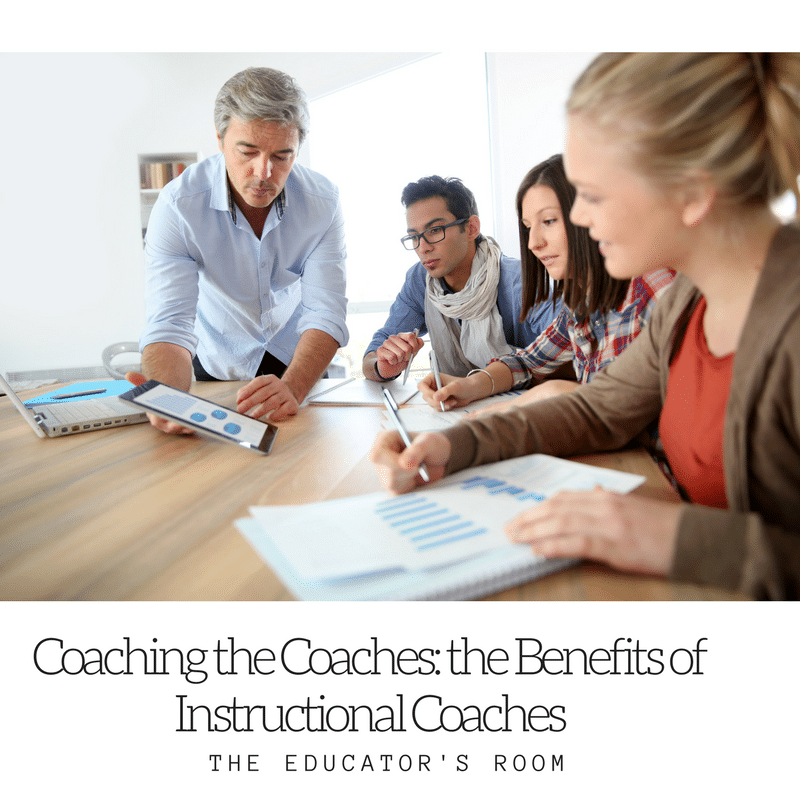Many teachers consider themselves to be coaches rather than just instructors. We are not just imparting knowledge, but we are there to mentor our students and develop them into becoming better thinkers, writers, readers, doers. We don’t bark orders, rather we kneel down and workshop papers and assist in labs and calculations. It is reasonable to assume that teachers would want to be the best coaches possible for their students; however, demanding schedules of lesson planning, assessment-creation, grading, and data digging leave little time for teachers to engage in seeking out resources or new strategies. This is why instructional coaches are becoming valuable in the districts that provide them.
[bctt tweet=”Many teachers think of their job as one of a coach rather than just an instructor.” username=”EducatorsRoom”]
The junior high where I teach in a Title 1 urban district in West Michigan decided to allocate some of our Title 1 Grant funds to providing four instructional coaches (one in each core area: math, science, English language arts, and social studies). Our coaches, who are all participating voluntarily, are all current veteran teachers in our building who have a history of strong educational practices.
I’ve brought up the idea of instructional coaches in other educator circles and was surprised that there was pushback and misinformation about the role they play in helping teachers be better at what they do in the classroom. From my admittedly limited perspective of working with our coaches during the first semester, I have seen many advantages to bring Instructional Coaches into the classroom.
Collaboration
In our school, our instructional coaches get an extra release hour on top of their planning hour to work on instructional coach responsibilities. This means they teach four classes (we are on a six-hour-plus lunch daily schedule), have a prep for their own teaching responsibilities and an additional hour for coaching. All four of our instructional coaches cite collaboration with their department and other departments as the number one thing on which they spend their coaching time.
From personal experience, I have been working with our ELA coach to develop curriculum for the 8th grade ELA classes. We’ve created fun activities like Book Tastings and World Read Aloud Day activities, as well as brainstorming better ways to assess our standards. I have also worked with our math coach on how I can better incorporate math in my classroom because one of our district goals is math across the curriculum.
Our ELA coach has worked across disciplines (specifically with the Health and PE teachers, but also in conjunction with Social Studies) to boost writing across the curriculum, and our science coach is devoted to working with her department on the new Next Generation Science Standards (NGSS) and what that implementation will look like. Our Social Studies coach has worked with some of our newer staff on creative and engaging ways to make history come alive as well as how to create more relevant assessments. Our math coach has even worked with one of our band directors on a collaboration of creating a “Music and Math” class for next year.
Research and Resources
I have often heard teachers complain that while they know there are really good ideas and resources “out there,” but they simply do not have the time to find and vet them. Instructional coaches do! Weekly we get emails from our coaches about internet resources and research that supports our best practice strategies.
When the 8th-grade team decided to try a Book Tasting Event with our students, it was our instructional coach who found the resources, reserved the Media Center for us, and created the materials we would need.
Our math coach provides her department with resources for state test prep, using questioning strategies related to their “8 standards for mathematical practices,” and the most innovative teaching and technology strategies that relate to math instruction.
Observation & Feedback
All of the instructional coaches have stated that one of the first things they did was get into classrooms to see firsthand the practices that were going on already in our building. They were very eager to share all the good things they saw that largely go otherwise unnoticed since teachers don’t tend to toot their own horns. Our math coach, for instance, could specify something awesome every single teacher in her department was doing.
Some teachers balk at the idea of having a coach observe them, feeling that they are being scrutinized. That is understandable given the trauma of judgment teachers often have to endure from the public and even from well-meaning administrators and the evaluation systems that are in place. However, in my experience with coaches, I have found that they are not there to “catch you,” so much as to get an idea of the great things that are already happening and be an outside observer of something you choose to have them coach you on.
Sometimes it’s behavior management, but more often it’s actual instructional practices. Our ELA coach has been invited into numerous classrooms to observe and then collaborate on lessons focused on the writing process and close and critical reading.
Our science coach is also observing what is currently being done in science classrooms so she can help teachers adapt their units when the NGSS rolls out next year.
Demo Lessons & Teaching Strategies
Sometimes the observations lead to a quick meeting or email giving feedback, but in some cases more in-depth collaboration occurs. One of the most specific examples of this comes from our ELA coach. She was able to observe one of our newer Health teachers and discuss the class’s paper on Character Values. She worked with him on how to make the assignment more relevant, then did a demonstration lesson to his first hour. After that, he taught the rest of the day–writing with the students and modeling how to cite sources in MLA format. Student writing was the best it had ever been for him.
There are so many other ways our coaches spend their time: developing new assessments and modifying old ones to be more relevant while maintaining rigor, mapping curriculum for the department, assisting our new teachers, and finding the latest and greatest strategies and resources for their subject area.
This is just our first year with instructional coaches and I can already see the benefits multiply as more and more teachers take advantage of the goldmine that we have available to us.





